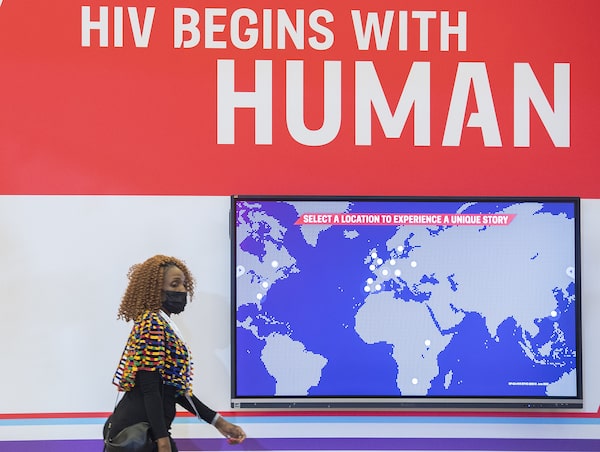
A woman walks by a sign during the AIDS 2022 conference in Montreal on July 31. More than 12,000 scientists, clinicians, activists and patients gathered for the 24th international AIDS Conference in Montreal this past week.Graham Hughes/The Canadian Press
Public health is having a moment.
In response to the threat of COVID-19, there have been unprecedented investments in vaccines, in research and public-health infrastructure. Interest in science, health and infectious diseases in particular has also soared.
But have the trillions of dollars spent on the coronavirus, and the political and societal upheavals that have occurred, left public health stronger or weaker?
Are we more, or less, able to deal with old and new infectious-disease threats such as AIDS, tuberculosis, hepatitis B and C, influenza, measles and monkeypox? And what about new pandemic threats that are lurking on the horizon?
HIV drugs are getting easier to take, and that’s good news for treatment and prevention
Combating HIV is costly but the cost of inaction is higher
As more than 12,000 scientists, clinicians, activists and patients gathered for the 24th international AIDS Conference in Montreal this past week, under the theme “Re-engage and follow the science,” those unanswered nerve-jangling questions were always bubbling below the surface.
“It’s easy to take a pessimistic view and to fear that the rise of another pandemic has drawn energy from our work,” said professor Sharon Lewin, president of the International AIDS Society and director of the Doherty Institute in Melbourne.
But she has embraced a more optimistic perspective: that COVID-19 has made everyone, from world leaders to the general public, realize just how important it is to tackle epidemics big and small.
After 40 years and 40 million dead, progress on fighting HIV-AIDS seems to have stalled. At the same time, the science has improved dramatically.
Antiretroviral drugs, taken daily by 28.7 million of the 38.4 million HIV-positive patients worldwide, keep illness at bay. Injectables that last months are in development. The impact has been stunning. In 1984, a 20-year-old infected with HIV had a life expectancy of less than a year. Today, a 20-year-old can expect to live to 56, and with mostly manageable symptoms.
Hopefully, those improvements in treatment will occur with the coronavirus, including long COVID.
Advances in AIDS vaccinology paved the way for the development of mRNA COVID vaccines, which, in turn, has reinvigorated the search for an AIDS vaccine.
But perhaps the most potent lesson of COVID is one that those toiling in the AIDS field learned long ago: All the medicine and technology in the world cannot end a pandemic unless there is the political will to do so.
Like AIDS (and virtually every other infectious disease), COVID is not an equal opportunity killer. It preys on the vulnerable living on the margins of society: those living in poverty and homelessness, Indigenous peoples, elders; those whose behaviours are criminalized such as drug users and sex workers; and those who are not cis-heteronormative, from men who have sex with men to transgender people.
“If we want end the AIDS pandemic, or any pandemic, we can’t afford to ignore inequality,” said Beatriz Grinsztejn, a researcher at the Evandro Chagas National Institute of Infectious Diseases in Rio de Janeiro, Brazil.
There has been a shift in public health in recent years – a new-found focus on equity. Increasingly, programs are targeted at high-risk groups, and for good reason.
People who inject drugs are 35 times more likely to be infected with HIV as those who do not; for female sex workers, it’s 30 times; men who have sex with men, 28 times; and transgender women, 14 times. All told, these high-risk groups account for 70 per cent of new infections.
Another reality is that co-infections are common. Pathogens travel in similar circles, so those at risk of HIV, are also more likely to contract TB, hepatitis B/C, COVID and monkeypox. Practically, that means programs should be less siloed. Cooperation matters.
But public health, like society more generally, has become highly politicized and polarized.
The AIDS and COVID responses have both demonstrated that failing to act quickly and forcefully in response to a newly emerging virus is enormously costly and disruptive.
These pandemics have demonstrated that the emphasis public health places on prevention and harm reduction is impactful, as well as the need to follow-up with a full range of initiatives, from testing to treatment.
The big unknowns in this era of multiple pandemics is whether the fatigue will get the best of us, and whether the streak of selfish individualism running through the heart of politics will result in a pulling back from public-health investments.
As Michael Standup, an Indigenous elder who gave the closing words at the AIDS conference, said: “The true pandemic we have to fear is indifference.”
Keep your Opinions sharp and informed. Get the Opinion newsletter. Sign up today.